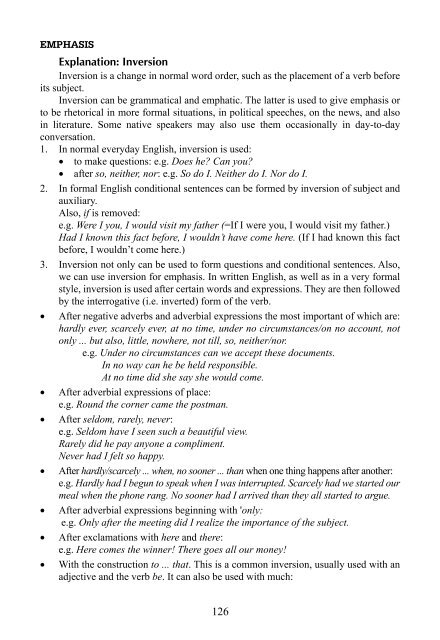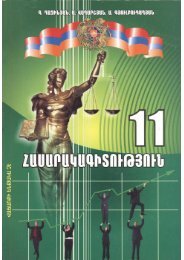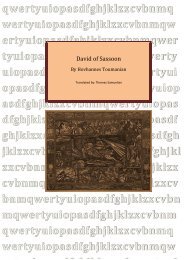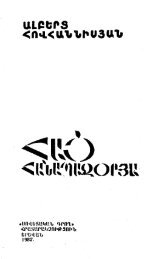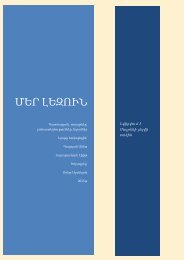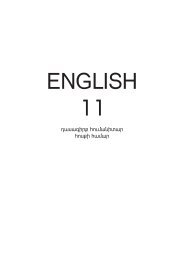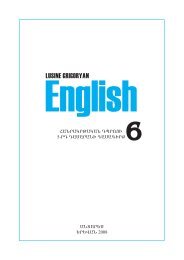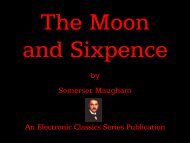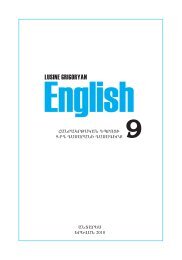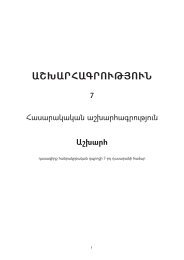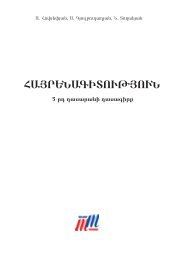Focus on Words
Focus on Words
Focus on Words
You also want an ePaper? Increase the reach of your titles
YUMPU automatically turns print PDFs into web optimized ePapers that Google loves.
EMPHASIS<br />
Explanati<strong>on</strong>: Inversi<strong>on</strong><br />
Inversi<strong>on</strong> is a change in normal word order, such as the placement of a verb before<br />
its subject.<br />
Inversi<strong>on</strong> can be grammatical and emphatic. The latter is used to give emphasis or<br />
to be rhetorical in more formal situati<strong>on</strong>s, in political speeches, <strong>on</strong> the news, and also<br />
in literature. Some native speakers may also use them occasi<strong>on</strong>ally in day-to-day<br />
c<strong>on</strong>versati<strong>on</strong>.<br />
1. In normal everyday English, inversi<strong>on</strong> is used:<br />
• to make questi<strong>on</strong>s: e.g. Does he? Can you?<br />
• after so, neither, nor: e.g. So do I. Neither do I. Nor do I.<br />
2. In formal English c<strong>on</strong>diti<strong>on</strong>al sentences can be formed by inversi<strong>on</strong> of subject and<br />
auxiliary.<br />
Also, if is removed:<br />
e.g. Were I you, I would visit my father (=If I were you, I would visit my father.)<br />
Had I known this fact before, I wouldn’t have come here. (If I had known this fact<br />
before, I wouldn’t come here.)<br />
3. Inversi<strong>on</strong> not <strong>on</strong>ly can be used to form questi<strong>on</strong>s and c<strong>on</strong>diti<strong>on</strong>al sentences. Also,<br />
we can use inversi<strong>on</strong> for emphasis. In written English, as well as in a very formal<br />
style, inversi<strong>on</strong> is used after certain words and expressi<strong>on</strong>s. They are then followed<br />
by the interrogative (i.e. inverted) form of the verb.<br />
• After negative adverbs and adverbial expressi<strong>on</strong>s the most important of which are:<br />
hardly ever, scarcely ever, at no time, under no circumstances/<strong>on</strong> no account, not<br />
<strong>on</strong>ly ... but also, little, nowhere, not till, so, neither/nor.<br />
e.g. Under no circumstances can we accept these documents.<br />
In no way can he be held resp<strong>on</strong>sible.<br />
At no time did she say she would come.<br />
• After adverbial expressi<strong>on</strong>s of place:<br />
e.g. Round the corner came the postman.<br />
• After seldom, rarely, never:<br />
e.g. Seldom have I seen such a beautiful view.<br />
Rarely did he pay any<strong>on</strong>e a compliment.<br />
Never had I felt so happy.<br />
• After hardly/scarcely ... when, no so<strong>on</strong>er ... than when <strong>on</strong>e thing happens after another:<br />
e.g. Hardly had I begun to speak when I was interrupted. Scarcely had we started our<br />
meal when the ph<strong>on</strong>e rang. No so<strong>on</strong>er had I arrived than they all started to argue.<br />
• After adverbial expressi<strong>on</strong>s beginning with '<strong>on</strong>ly:<br />
e.g. Only after the meeting did I realize the importance of the subject.<br />
• After exclamati<strong>on</strong>s with here and there:<br />
e.g. Here comes the winner! There goes all our m<strong>on</strong>ey!<br />
• With the c<strong>on</strong>structi<strong>on</strong> to ... that. This is a comm<strong>on</strong> inversi<strong>on</strong>, usually used with an<br />
adjective and the verb be. It can also be used with much:<br />
126


